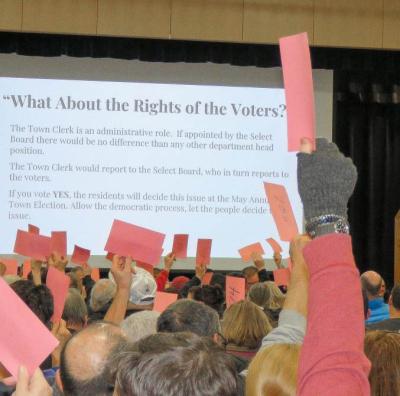Lakeville Town Meeting to address budget, projects, bylaw amendments
LAKEVILLE — Voters will address the 2026 budget as well as several improvement projects and bylaw amendments at the June 9 Town Meeting, scheduled for 6:30 p.m. at Apponequet Regional High School.
A Special Town Meeting will take place at the same time. Spending approved during the Special Town Meeting is available the following day and will be included in the current year's budget. Spending approved during the regular Town Meeting is part of next year’s budget and available July 1.
All of Lakeville’s registered voters are eligible to attend, participate, and vote.
Along with being asked to approve the $39 million town budget, voters will also address several capital spending items, including improvements to the library and transfer station. The spending items are as follows:
Transfer station improvements. Voters will consider spending $83,451 on improvements to the transfer station, including purchasing a new compactor and replacing the LED lights.
Library repairs. Voters will hear a proposal to spend $290,000 on replacing the roof and heating system of the Lakeville Public Library.
Sewer engineering. If approved, $50,000 would be spent on engineering for the municipal separate storm sewer system.
Town website. Town officials are seeking approval of $30,000 in spending for the town website, in part to transition it to a .gov domain.
Police vehicle. If approved, the police department will use $128,000 to replace a vehicle and some equipment.
Fire vehicle. If approved, the fire department will use $175,000 to lease a ladder truck. The contract would include a purchase-to-lease agreement.
Cemetery repairs. Voters will consider spending $10,000 on gravestone repairs at Thompson Hill Cemetery.
Along with capital spending, votes will weigh the pros and cons of making several changes to the town’s bylaws, including adjusting which projects require site plan review and including the definition of an accessory dwelling unit. The changes are as follows:
Unregistered vehicles. According to a town bylaw, residents of Lakeville are not allowed to store unregistered vehicles in front yards. Only one unregistered vehicle is allowed per property unless kept in a garage or approved by the Select Board. Additional vehicles require a permit, with approval based on factors like lot size, location, and visibility. Violations may result in daily fines starting at $100.
Currently, the bylaw does not include an enforcement provision. Voters will decide whether to amend the bylaw to allow enforcement by either the Building Commissioner or police officers.
Abandoned funds. Voters will consider accepting a state law that allows the town to formally take ownership of money that hasn’t been claimed for over a year, such as uncashed checks, refunds, or deposits.
The treasurer would be required to post a public notice explaining how to claim the funds. If no claim is made within 60 days, the treasurer can publish a final notice and reissue the money for town use.
Accessory dwelling units. In August 2024, Massachusetts passed the Affordable Homes Act and amended zoning laws statewide to address housing affordability and availability by allowing properties zoned single family to have a second independent living space, known as an accessory dwelling unit or “in-law apartment.”
Voters will consider amending Lakeville’s zoning bylaws to include the definition of an accessory dwelling unit.
The units are defined as a property less than 900 square feet with a separate entrance. As part of the definition, the bylaw states that the units do not require a special permit or discretionary zoning approval.
General zoning bylaw changes. Voters will consider amending the zoning bylaws to require site plan review for building projects that significantly increase traffic, noise, parking, or lighting in the area.
If passed, the amendment would also clarify that minor interior changes or projects with no change in use won’t need review.
The amendment also makes some administrative changes including requiring applicants to include a statement explaining the proposed use of the property. In addition, applications would be submitted to the Planning Department instead of the Town Clerk.
Money committees. If passed, members of the Finance Committee would also be able to serve on the Economic Development Committee.
Before Town Meeting ends, voters will also make decisions on several roadway changes and, of course, address the routine spending items required to fund the town government.















